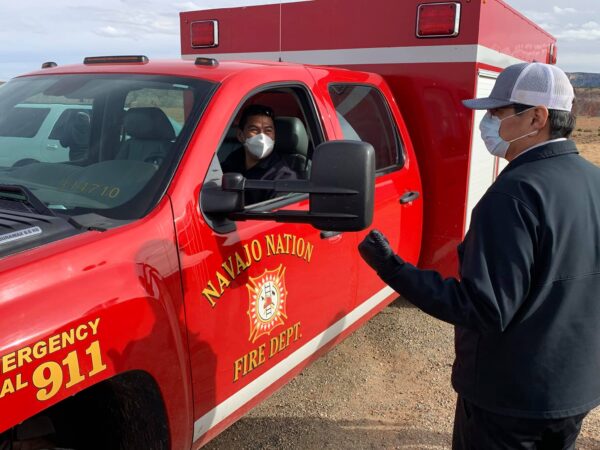
- Details
- By Native News Online Staff
WINDOW ROCK, Ariz. - On Monday, the Navajo Department of Health, in coordination with the Navajo Epidemiology Center and the Navajo Area Indian Health Service, reported 22 new cases of COVID-19 for the Navajo Nation and no new deaths. The total number of deaths is 311 as of Monday. Reports from 11 health care facilities indicate that approximately 3,207 individuals have recovered from COVID-19, with one health care facility report still pending. 44,589 people have been tested for COVID-19. The total number of positive COVID-19 cases for the Navajo Nation has reached 6,633.
Navajo Nation cases by Service Unit:
- Chinle Service Unit: 1,728
- Crownpoint Service Unit: 614
- Ft. Defiance Service Unit: 418
- Gallup Service Unit: 1,118
- Kayenta Service Unit: 961
- Shiprock Service Unit: 1,096
- Tuba City Service Unit: 543
- Winslow Service Unit: 147
* Eight residences are not specific enough to place them accurately in a Service Unit
Navajo Nation President Jonathan Nez and Vice President Myron Lizer continue to urge Navajo citizens to remain home as much as possible to avoid another spike in new cases, especially as other areas in the state of Arizona continue to see daily increases in new cases.
"Today, lower number of cases were reported, and it is proof that all preventive measures and public health orders are working. Since the state of Arizona relaxed its precautions and discontinued its stay-at-home order, the number of cases and hospitalizations are increasing daily. We cannot put our Nation in that same situation, so we stress to our Navajo people the importance of staying home as much as possible and complying with all public health orders, including wearing a mask and the daily curfews. Let's work together and get this virus off our homelands," President Nez said.
The Navajo Nation's public health emergency orders, including requiring the use of protective masks in public and the daily curfews from 8:00 p.m. to 5:00 a.m., are still in effect throughout the Navajo Nation.
"The virus has not left our Nation, and this is not the time to let our guard down. If you are feeling any COVID-19 symptoms, such as coughing, fever, chills, muscle pain, shortness of breath, sore throat, and new loss of taste or smell, please see your nearest healthcare center. Symptoms can range from mild to severe illness and appear 2-14 days after COVID-19 exposure. Seek medical care immediately if someone has emergency warning signs of COVID-19. We need to take care of one another to stop the spread,” said Vice President Lizer said.
On Tuesday at 10:00 a.m. (MDT), President Nez and Vice President Myron Lizer will host another online town hall to provide the latest COVID-19 updates. There will also be updates provided by the U.S. Census office regarding the 2020 Census Count on the Navajo Nation.
To Donate to the Navajo Nation
The official webpage for donations to the Navajo Nation, which has further details on how to support the Nation’s Dikos Ntsaaígíí-19 (COVID-19) efforts is: http://www.nndoh.org/donate.html.
For More Information
For more information including reports, helpful prevention tips, and more resources, please visit the Navajo Department of Health’s COVID-19 website at http://www.ndoh.navajo-nsn.
For up to date information on impact the coronavirus pandemic is having in the United States and around the world go to: https://www.worldometers.info/coronavirus/country/us/?fbclid=IwAR1vxfcHfMBnmTFm6hBICQcdbV5aRnMimeP3hVYHdlxJtFWdKF80VV8iHgE
For up-to-date information about COVID-19, Native News Online encourages you to go to Indian Health Service’s COVID-19 webpage and review CDC’s COVID-19
More Stories Like This
Native News Weekly (August 25, 2024): D.C. BriefsUS Presidents in Their Own Words Concerning American Indians
Native News Weekly (December 21, 2025): D.C. Briefs
Native America Celebrates the Winter Solstice
Tlingit & Haida Launch New Foundation to Support Education, Wellness
Help us defend tribal sovereignty.
At Native News Online, our mission is rooted in telling the stories that strengthen sovereignty and uplift Indigenous voices — not just at year’s end, but every single day.
Because of your generosity last year, we were able to keep our reporters on the ground in tribal communities, at national gatherings and in the halls of Congress — covering the issues that matter most to Indian Country: sovereignty, culture, education, health and economic opportunity.
That support sustained us through a tough year in 2025. Now, as we look to the year ahead, we need your help right now to ensure warrior journalism remains strong — reporting that defends tribal sovereignty, amplifies Native truth, and holds power accountable.
 The stakes couldn't be higher. Your support keeps Native voices heard, Native stories told and Native sovereignty defended.
The stakes couldn't be higher. Your support keeps Native voices heard, Native stories told and Native sovereignty defended.
Stand with Warrior Journalism today.
Levi Rickert (Potawatomi), Editor & Publisher

